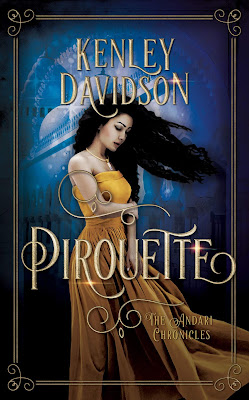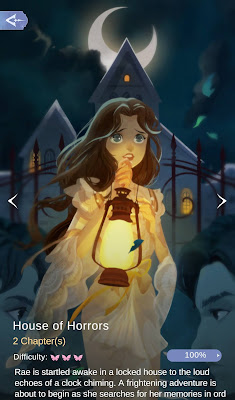Review: Pirouette
I finally completed the third book in Kenley Davidson's Andari Chronicles, and I am pleased to say that Pirouette had everything I felt that the first book, Traitor's Masque, was lacking. Not only is it my favorite adaptation of "The Twelve Dancing Princesses" that I've read so far, but it also boasts a disabled princess as the book's main heroine instead of making her a friend or supporting character. The biggest surprise to me after reading the other two books was that the world of the Andari Chronicles does indeed contain magic. It's just that no one in Andar knew about it because their kingdom had magic-blocking properties that they were unaware of. This opened up a whole new set of conflicts that made the story of Pirouette the most engaging, exciting, and suspenseful one in the series so far. I savored every paragraph and finished it wanting more.
Most adaptations of "The Twelve Dancing Princesses" alter the original fairy tale by turning the princesses' nightly outings into a curse that they want to escape from. I had seen this so many times that I was beginning to despise the trope that sucked the sense of wonder and pleasure out of one of my favorite fairy tales. Kenley Davidson is a daring author who does not follow any common trends in adaptations. As such, Pirouette features twelve princesses who love to dance and an overlooked thirteenth who also loves dancing but cannot do it because she is crippled. Princess Ilani was abused after dancing in public for the first time due to exhibiting signs of prohibited magic use. Her leg was damaged so far beyond repair that she was forced to walk with a cane for the rest of her life and became shunned by royal family because of the importance that her kingdom's culture placed on dance. She displays an incredible amount of inner strength while never making excuses for her disability or downplaying the negative effects it has on self of self-worth.
Lord Kyril was introduced Traitor's Masque, the first of the Andari Chronicles, as the insecure best friend of Prince Ramsey. In Pirouette, Kyril takes the helm as an Andari spy who wishes to make sure that Ramsey's wicked brother, Rowan, does not spread his malicious seed on the kingdom of Caelan. He winds up with a lot more than he bargained for when he uncovers several secrets about his own past and finds himself falling for the forsaken Caelani princess. Though they speak different languages, he is able to communicate with Ilani using a magic talisman that is given to him at the beginning of the book. Their romance is incredibly touching because both Ilani and Kyril look down on themselves and lift each other's spirits in a way that they could never accomplish on their own. Kyril refuses to see Ilani as a pitiful crippled damsel in distress, and Ilani likewise refuses to see Kyril as an ignorant foreigner, allowing them to draw strength from each other.
Pirouette contains a few painful lessons about family and trust. Both Kyril and Ilani have relatives that left permanent scars on their lives in one way or another. In the end, they must both decide who they can place their trust in. In some ways, the story reminded me of Disney's Pocahontas because Ilani introduces Kyril to a completely new world of magic and dance, and they learn to care for each other and navigate each other's cultures despite appearing to have nothing in common. Kyril's mission to uncover Rowan's plot in Caelan dragged a little toward the end of the book, but Ilani's resolve to be seen and heard again after being ignored for thirteen long years made it worth reading to the end. Most of her twelve sisters are barely mentioned, but her relationship with Varinda, the oldest, goes through a fascinating metamorphosis that always keeps you guessing.
If you're are longing for a fairy tale that supports girls with disabilities, Pirouette is the book for you. If you want an exciting story about two unlikely lovers who are brought together from vastly different cultures, Pirouette is also a fantastic choice. I've never seen an adaptation of "The Twelve Dancing Princesses" with this sort of twist, and I thought it was so clever to include a princess who can't dance while never apologizing or making excuses for Ilani's physical disability. She is an incredibly brave, smart, and resourceful character with a story worth telling to any girl who ever felt like she wasn't good enough.
Most adaptations of "The Twelve Dancing Princesses" alter the original fairy tale by turning the princesses' nightly outings into a curse that they want to escape from. I had seen this so many times that I was beginning to despise the trope that sucked the sense of wonder and pleasure out of one of my favorite fairy tales. Kenley Davidson is a daring author who does not follow any common trends in adaptations. As such, Pirouette features twelve princesses who love to dance and an overlooked thirteenth who also loves dancing but cannot do it because she is crippled. Princess Ilani was abused after dancing in public for the first time due to exhibiting signs of prohibited magic use. Her leg was damaged so far beyond repair that she was forced to walk with a cane for the rest of her life and became shunned by royal family because of the importance that her kingdom's culture placed on dance. She displays an incredible amount of inner strength while never making excuses for her disability or downplaying the negative effects it has on self of self-worth.
Lord Kyril was introduced Traitor's Masque, the first of the Andari Chronicles, as the insecure best friend of Prince Ramsey. In Pirouette, Kyril takes the helm as an Andari spy who wishes to make sure that Ramsey's wicked brother, Rowan, does not spread his malicious seed on the kingdom of Caelan. He winds up with a lot more than he bargained for when he uncovers several secrets about his own past and finds himself falling for the forsaken Caelani princess. Though they speak different languages, he is able to communicate with Ilani using a magic talisman that is given to him at the beginning of the book. Their romance is incredibly touching because both Ilani and Kyril look down on themselves and lift each other's spirits in a way that they could never accomplish on their own. Kyril refuses to see Ilani as a pitiful crippled damsel in distress, and Ilani likewise refuses to see Kyril as an ignorant foreigner, allowing them to draw strength from each other.
Pirouette contains a few painful lessons about family and trust. Both Kyril and Ilani have relatives that left permanent scars on their lives in one way or another. In the end, they must both decide who they can place their trust in. In some ways, the story reminded me of Disney's Pocahontas because Ilani introduces Kyril to a completely new world of magic and dance, and they learn to care for each other and navigate each other's cultures despite appearing to have nothing in common. Kyril's mission to uncover Rowan's plot in Caelan dragged a little toward the end of the book, but Ilani's resolve to be seen and heard again after being ignored for thirteen long years made it worth reading to the end. Most of her twelve sisters are barely mentioned, but her relationship with Varinda, the oldest, goes through a fascinating metamorphosis that always keeps you guessing.
If you're are longing for a fairy tale that supports girls with disabilities, Pirouette is the book for you. If you want an exciting story about two unlikely lovers who are brought together from vastly different cultures, Pirouette is also a fantastic choice. I've never seen an adaptation of "The Twelve Dancing Princesses" with this sort of twist, and I thought it was so clever to include a princess who can't dance while never apologizing or making excuses for Ilani's physical disability. She is an incredibly brave, smart, and resourceful character with a story worth telling to any girl who ever felt like she wasn't good enough.











Comments